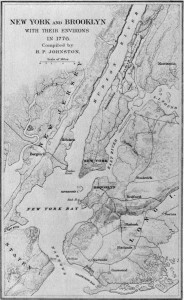
George Washington campaigned here
150 years ago today New York City celebrated George Washington’s birthday, and a sanitary fair opened in Brooklyn to support the United States Sanitary Commission.
From The New-York Times February 23, 1864:
WASHINGTON’S BIRTHDAY.; CELEBRATION IN THIS CITY AND VICINITY. Opening of the Brooklyn Sanitary Fair. CELEBRATION OF THE PUBLIC SCHOOLS. PYROTECHNIC DISPLAYS. THE MUNICIPAL BANQUET. CELEBRATION IN BROOKLYN. BROOKLYN SANITARY FAIR.
The one hundred and thirty-second anniversary of the birthday of WASHINGTON was celebrated, yesterday, with more than ordinary enthusiasm. The military display was not equal to former occasions, but the “turn out” of the people was unusually large and enthusiastic. Flags were displayed from the public buildings, prominent places of business, and many private residences, and in various other ways was the disposition to commemorate “the day we celebrate” manifested.
The parks and squares were filled with people, and although business was not suspended, the City wore a holiday appearance.
At sunrise a salute of one hundred guns was fired at Madison-square, which was the opening note for the festivities of the day.
At 11 o’clock the veterans of 1812 assembled at the Mercer House, and marched down Broadway to the Battery, where they fired the customary salute. Few of them wore the Continental uniform, but their soldiery bearing and careful attention to discipline drew frequent cheers from the crowds assembled to greet them. At noon, while the veterans were returning from the Battery, the Trinity chimes were rung, and at 1 o’clock the old soldiers were reviewed by the Mayor at the City Hall.
The grand review of the Eighth, Eleventh, Twenty-second and Seventy-first Regiments by the Mayor and Common Council was the principal feature of the day. …
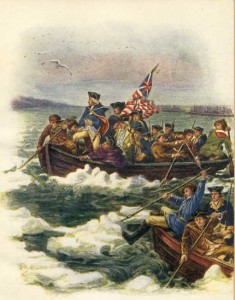
a fireworks’ theme
The large hall of the Cooper Institute was thronged yesterday afternoon and evening by a respectable audience, composed of the teachers and pupils of the public schools, who had assembled to honor the birthday of WASHINGTON by appropriate exercises. The proceeds of the entertainment were set apart for the benefit of the orphans of soldiers.
The fireworks at Union-square and the City Hall were especially suited to the occasion. The principal piece at Union-square was “Washington,” with Liberty and Justice on either side. “Washington Crossing the Delaware” was represented at the City Hall. This piece is understood to be the largest ever produced in this City. The water-line was in the fore-ground, while the background was occupied by representations of WASHINGTON and the scow in which he crossed the river. The water-line was about one hundred and fifty feet long. The display began at 7 o’clock, but the great piece was not fired until 8 o’clock.
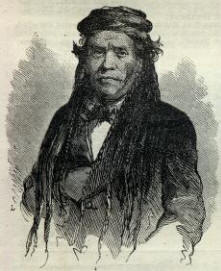
Mojave Chief Irataba at Delmonico’s
Last evening, the City authorities and many distinguished citizens sat down to a sumptuous feast at DELMONICO’s, in Fifth-avenue, and after the removal of the cloth, Alderman HENRY, in the absence of the Mayor, took the chair, and made an appropriate speech, introducing the first toast of the evening, namely: “The Day we Celebrate.” Surveyor Andrews, Ex-Mayor Opdyke, Mr. Thomas C. Fields, Orlando Stewart, Esq., Dr. Bradford and Recorder Hoffman made brief and pertinent speeches, and songs were sung by the Union Glee Club. Among those present were Judges LEONARD, BARBOUR, RUSBELL, and the Indian Chief, IRATABA. DODWORTH supplied the music.
The anniversary was more generally celebrated in Brooklyn, yesterday, than ever before. The public offices and places of business generally were closed in the afternoon, in accordance with the recommendation of the Mayor, and everybody appeared to have turned out into the streets.
The weather was remarkably fine, and the women and children, taking advantage of the day, crowded the thoroughfares. Fulton-street was virtually jammed from the Ferry to the City Hall, while about the Park and the Academy of Music the throngs were so dense that it was difficult, and in some cases impossible, to move through them.
Flags were displayed from all the public buildings, and from a large number of private residences.
The grand feature of the day was the parade, and never since the organization of the local militia was there so fine a display in this city. The regiments all turned out in full ranks, and presented a better appearance in every respect than they ever did before. …
The opening of the Brooklyn Sanitary Fair last evening was an event of more than ordinary importance. For weeks the citizens of Brooklyn have been making the most determined efforts to insure the success of their great enterprise, and the brilliant display at the Academy of Music last night must have been exceedingly gratifying to them.
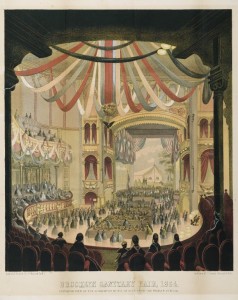
The Academy of Music part of Sanitary Fair
At an early hour immense throngs began to crowd every avenue surrounding the building, and at the time the public were permitted to enter, fears were entertained of serious accidents. The Academy of Music, the buildings opposite, and Knickerbocker Hall, were splendidly illuminated, and the scene was one difficult of description. There seemed to be an out-door as well as an in-door fair, for hundreds were unable to gain admission. The whole affair may be expressed in the one word — jam. The inside of the Academy, where the grand bazar of fancy goods is held, is not decorated with the elaboration which di[s]tinguishes Knickerbocker Hall. Its vast proportions forbid it, no less as a matter of taste than of practicacility. This comparative plainness, however, brings the brilliance of the tables into proper and happy relief. From the centre of the ceiling depends a columnial mass of drapery, from the apex of which broad bands of alternate red, white, and blue bunting radiate in graceful curves to the pillars and amphitheatre, and thence droop in festoons between each. From the bottom of the columnar mass in the centre is suspended an American eagle, with outstretched wings, and grasping the national shield and colors. The effect is as if the proud bird were hovering in mid air over the heads of the spectators. The great drop curtain has been caught up and stretched over the stage, giving the rich effect of a crimson ceiling. The ugly woodwork of the side scenes is concealed by white muslin, with charming reliefs of the national colors. It is proper here to say that the decorations are the work of Mr. WM. PAYNE, of No. 300 Fulton-avenue, who has, in the most generous manner, given his personal superintendence and services, besides loaning the material for the decorations. To Mr. DEGRAUW, Chairman of the Committee on Decorations, great credit is due for taste and energy.
A superb feature of the decorations of the auditorium is a painting by CALLAO, so large as to cover the entire unsightly back wall of the stage, and representing a camp scene with the United States Sanitary Commission tent in the foreground, displaying the attendants of the commission ministering to the sick. The faithfulness of this representation is guaranteed by the appearance of a real tent in the Academy, and very near it, containing wounded soldiers from David’s Island and attendants of the commission, and showing the practical workings of the commission.
Prominent among the features of the Fair, are the apartments allotted to the Treasurer’s Office and the Post-office, occupying a proscenium box on either side. An elegant soda fountain stands at the stage-door entrance on Montague-street. In the centre of the room, on a raised and carpeted platform, stands a magnificent piano, gift of Messrs. STEINWAY & SONS. A suggestive emblem of Dixie’s happy land, in the shape of a palmetto tree, mounts grim and thorny guard over the Sanitary tent.
A brilliant effect is produced by the hundreds of vividly-colored Afghans and bed-quilts of worsted, silk, satin, or more homely, but sensible, and by no means cheap, cotton, which are hung at the back of the family circle, it was difficult to get a glimpse of all that was presented for public inspection.
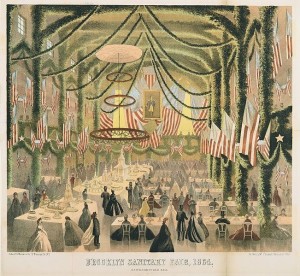
General Washington’s portrait at Knickerbocker Hall
Knickerbocker Hall was most elaborately decorated with evergreens, made into wreaths, pillars, arches, stars and festoons. Over the Montague-street entrance is a tasteful combination of evergreen and flags. Around the ground floor are arches, on each side of which are shields, draped with miniature flags, and in each arch a white star. At the southern end of the building a fine full-length portrait of WASHINGTON, surrounded by flags and other patriotic emblems. The walls are covered with flags — indeed, everywhere where the green is not, the red, white and blue takes its place. Pendant from the ceiling hangs a gigantic chandelier, with two hundred burners:
The New-England Kitchen is also a prominent feature, and one deserving of all the attention bestowed upon it, which was anything but slight last evening. The entertainment closed a few moments after 10 o’clock, the hour announced in the programme. To-day hundreds will undoubtedly embrace the opportunity to see what last evening it was quite difficult to get a distant view of. In future the charge will be fifty-five cents for admission to all parts and departments of the Fai[r]. At the same time those who desire to visit at any time only the main Fair in the auditorium are required to pay but twenty-five cents, the sum of ten cents being charged for admission to ea[c]h of the separate departments, the museum of arts, relics and curiosities, the picture gallery, and the New-England kitchen.
These charges are moderate, and will receive the approval of the public.
I was impressed by the schoolchildren putting on a program at the Cooper Institute and donating the proceeds to orphans of soldiers.
The image of Irataba was published in the February 13, 1864 issue of Harper’s Weekly at Son of the South, where you can read more about him. So far on his trip to Washington, D.C. and New York he had most impressed by a school of whales near San Francisco.
You can read more and see more of the fair at the March 5, 1864 issueHarper’s Weekly.

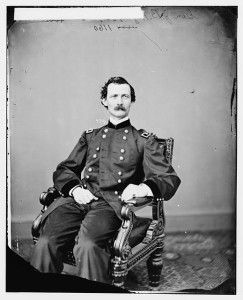
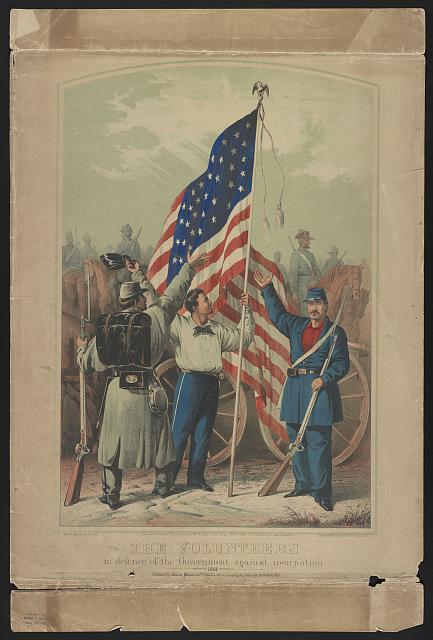
![[Civil War envelope showing Columbia, eagle, shield, state seal of New York, and banner with message "New York loyal to the Union"] (between 1861 and 1865; LOC: LC-DIG-ppmsca-34646)](https://www.bluegrayreview.com/wp-content/uploads/2014/02/34646r.jpg)
![Young American crushing rebellion and sedition ( [Philadelphia] : Published by William Sartain, 728 Sansom St., Phila., c1864; LOC: LC-USZ62-90673)](https://www.bluegrayreview.com/wp-content/uploads/2014/02/3b37022r-181x300.jpg)




